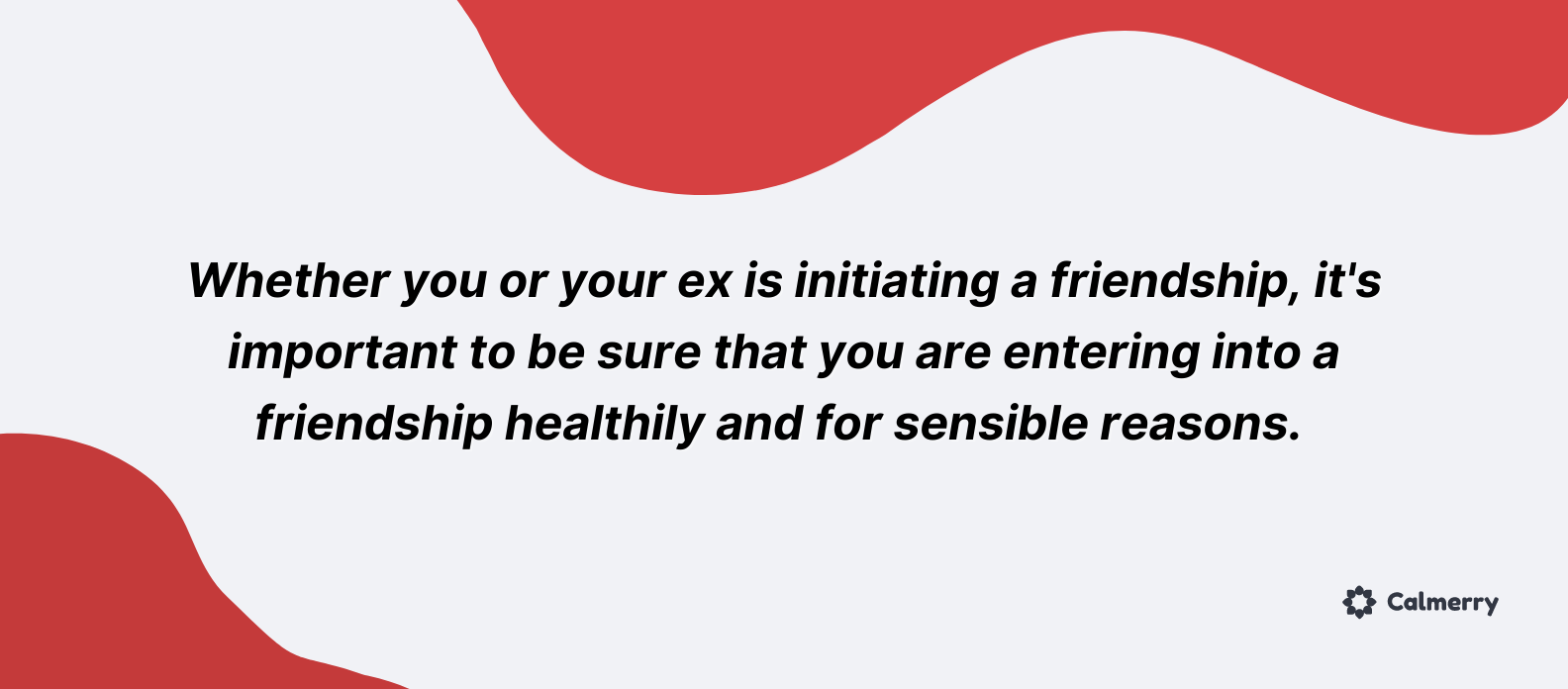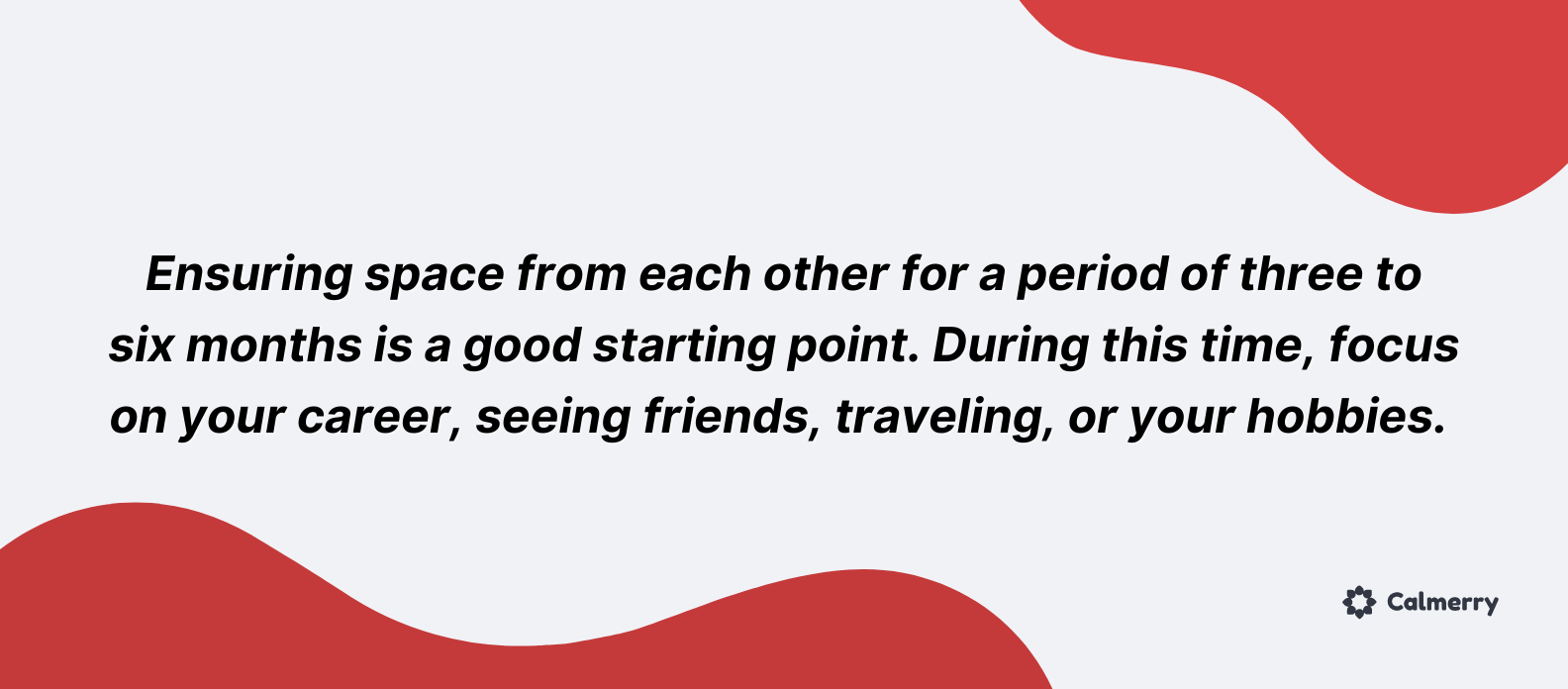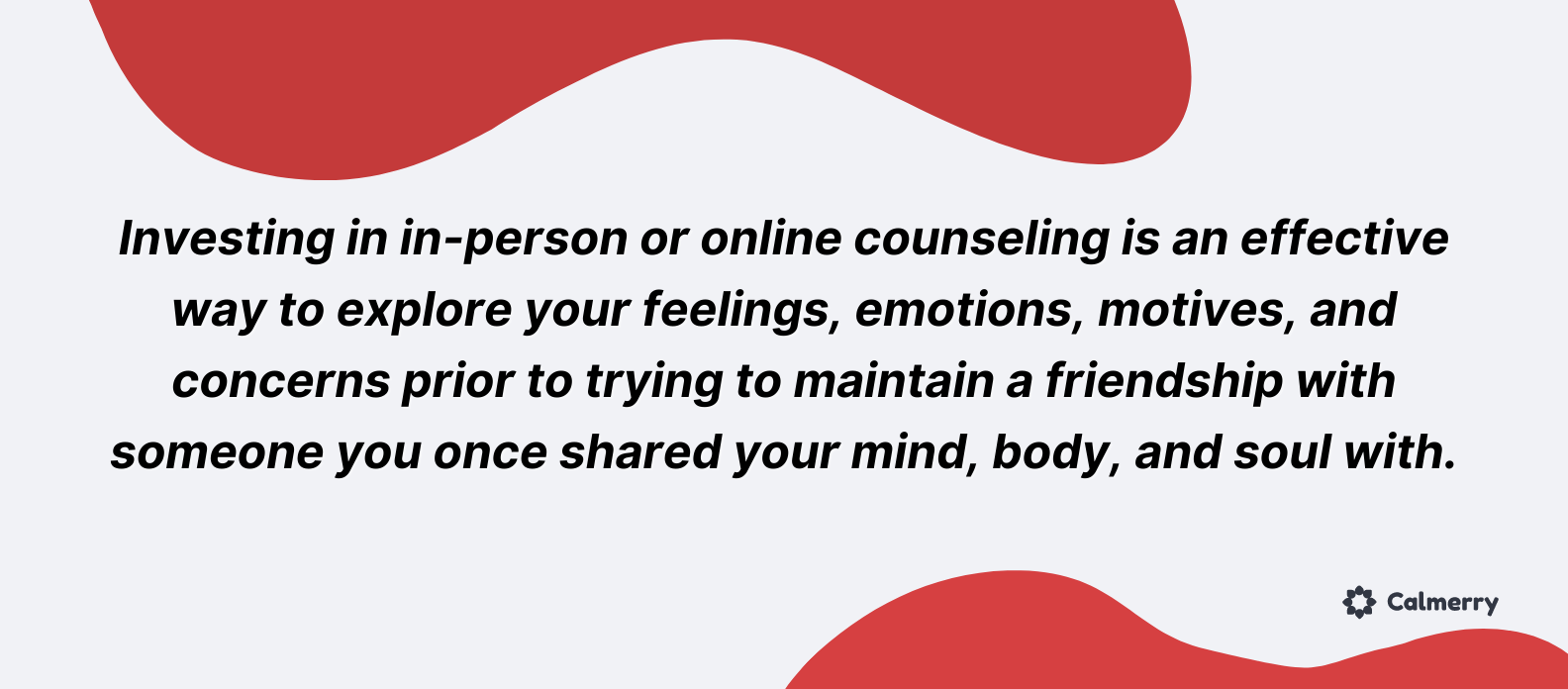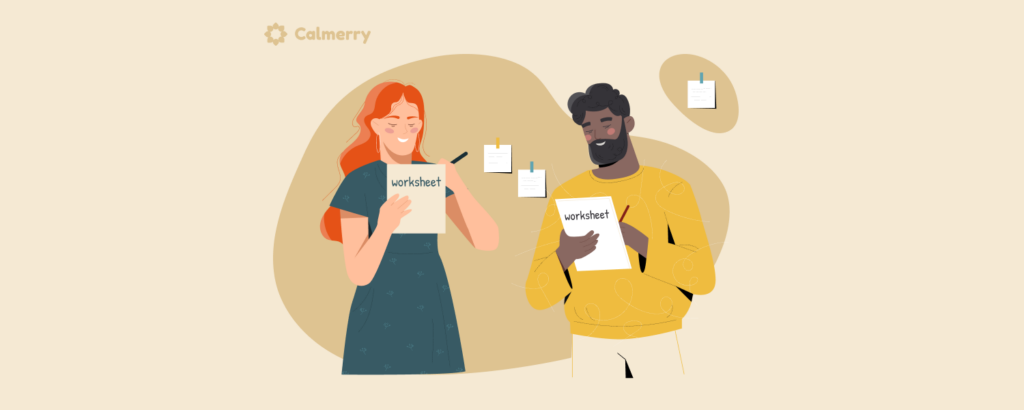Always There for You: Can Exes Be Friends?

Table of Contents
If you ask a group of people whether they would want to stay friends with their exes, you’ll likely get answers at both ends of the spectrum. For some, staying friends with an ex is an absolute no-no, but for others, being friends after a breakup can be the healthy next step in your changed relationship.
In this article, we will explore the dynamics of transitioning from romantic partners to friends, shedding light on when and how to navigate this shift while maintaining healthy relationships with your ex.
What if my ex wants to be friends?
If your ex wants to be friends, you may be taken aback at first. In the not-so-distant past, when a relationship broke down, both parties ended communication and went their separate ways. However, with the ease of instant communication and the presence of social media, nowadays, it is far harder to walk away without a backward glance.
A study in 2017 found that staying friends with a partner permits the “exchange of resources.” These resources might include money, information, love, sex, or status. The most important reasons for staying friends with an ex included that they were reliable, trustworthy, or that there were sentimental reasons for continuing a friendship after a relationship breakdown.

Can exes be friends?
When a relationship ends, the aftermath is often fraught and messy. Even if your relationship ends mutually or amicably, you may both be left feeling sad, disappointed, or frustrated.
However, there are several situations in which you might want to try to maintain a friendship with your ex. It is important to note that some reasons may be healthier than others.
- Practical reasons such as having some mutual friends, still working together, or co-parenting;
- Feeling that beneath the relationship, you had a solid, secure friendship that can be maintained;
- Having unresolved feelings for your ex or wanting to numb the pain of the breakup or divorce by remaining close.
Only you can decide if trying to be friends with your ex is a sensible, beneficial decision.
If you have practical reasons or belief that a secure and healthy friendship is truly possible, you can move forward into the next stage of friendship together. Conversely, trying to be friends with your ex for unhealthy reasons may cause you more pain long term.
The following points will help you work out if you are pursuing friendship for the benefit of you both.
Wait a while
For most people, friendship is only likely to be possible once the wounds of the relationship have healed. Even for parents trying to maintain a friendship for the sake of co-parenting their children, civility is a more likely first step while both partners work through the complex emotional and practical aftermath. Only later can true friendship be achieved.
For those who have unresolved feelings or can’t bear to let their ex go, staying friends is likely to cause emotional harm. Remaining near your ex may temporarily numb the pain you are experiencing, but in the long term, this is an unhealthy strategy that won’t help you heal or move on.
Regardless of how your relationship ends, it’s not until the dust settles that you can truly understand how you feel about your ex. A period of self-reflection, sessions with a therapist, or some time for personal growth may all be required to ensure you can accurately recognize if being friends with your ex is a good idea.
How long you wait may depend on the seriousness and quality of your relationship and how it ended.

Explore your new, single life until you feel happy with what you have created. This way, you’ll know whether you truly want your ex in your life or these previous desires had their basis in grief or loneliness.
Complete a relationship inventory
Whether a friendship is sensible or even possible may depend on how the relationship ended and the lives you and your ex-partner lead now. If they cheated on you, friendship might be very difficult if resentment or anger remains. If your ex is now with a new partner, attempting to be friends may leave you feeling jealous or rejected.
As well as looking at why it ended, it’s also important to look at the relationship as a whole. Once you and your ex have formally separated or broken up, take the time to complete a relationship inventory:
- On one side of a piece of paper, list all the good things about your relationship.
- On the other, list all the negatives.
- Read through your lists and think about whether your ex is the person you still want in your life.
Of course, exes can be even better friends than partners. However, if your negative list includes them belittling you, gaslighting you, being controlling, or leaving you feeling unappreciated, you need to ask yourself this again — are they the person you still want to have in your life?
If you can’t think of any negatives about your ex, other than the fact that the relationship ended, you should consider whether you have a case of unrequited love. Trying to sustain a friendship in this situation is sadly likely to lead to heartbreak for you.

How to be friends with an ex
If you have given each other time and space and decided that friendship is the way forward, it’s important to re-establish your boundaries as you move from a romantic relationship to something purely platonic.
Check your progress
Even if six months have passed since you broke up and you are still stalking your ex on Facebook or Instagram, it’s unlikely you are ready to be their friend. It also may be best to stop following them altogether.
If you become upset or angry even thinking about your ex dating someone new, then a friendship at this point is not advisable.
If your ex wants to be friends, but you don’t feel ready, consider whether you even want to be their friend. If you are sure that you do, book in for some counseling, then check back on how you are feeling in another three months. If you don’t want to be friends, it’s perfectly acceptable to tell your ex that you can’t have a friendship with them.
Establish boundaries
Your boundaries as friends will be vastly different from those you had as a couple. Make sure you are both clear on the acceptable boundaries of your platonic friendship, which might include no flirting, minimal physical contact, and the request that some conversations are off-limits.
If you are co-parenting, you may communicate or see each other more regularly than you would otherwise. Keep the conversation about your children to avoid falling into old communication habits or becoming too involved in each other’s lives.
Make sensible choices
Old habits die hard. So make sure your friendship is different from your past relationship. Rather than romantic dinners or cocktail bars, stick to meeting for a morning coffee or a walk.
Meeting in public may help prevent arguments from starting, or conversely, prevent you from becoming intimate with each other.
Be respectful
Being friends with an ex may mean behaving very differently from how you were as a couple. You should become less invested in each other, better able to let annoyances go, and willing to ignore bad habits.
Remember that you are now entering a friendship rather than a partnership. So you’ll need to be respectful and dignified, letting go of past grievances and focused on enjoying time together.
Continue therapy
People who have counseling following a relationship breakdown can find it helpful to continue speaking to their therapist while they try to build a friendship with their ex.
Creating a safe space, whether through open conversations or online therapy, allows you to speak openly about any emotions brought to the surface. In this way, you can ensure your friendship is healthy or recognize when being friends just won’t work.
Final thoughts
Being friends with an ex can work for some people. If both ex-partners want a platonic friendship, can impose sensible boundaries, and are willing to wait for emotional healing to take place, it’s possible to remain friends with an ex.
However, accessing support from a Calmerry therapist is vital for working through your feelings. It will help you ensure you or your ex-partner seek friendship for healthy reasons and that being friends with your ex is a sensible, healthy choice.
-
Learn morePersonalized online therapyChoose video, messaging, or both to fit your schedule and comfort. Get matched with your therapist within 1 hour.
-
Learn moreOne 60-minute live video sessionSee how online therapy works and get quick support with a single therapy session. No commitments.


